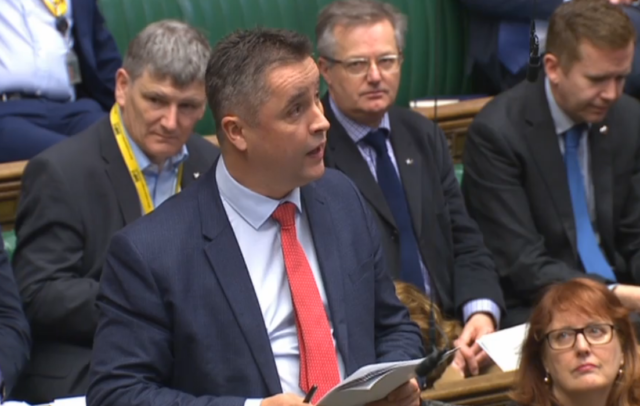
A “Good Samaritan Bill” aiming to help reunite refugee families in the UK has cleared its first Commons test, amid Tory pleas for action.
MPs cheered and there was applause in the Commons chamber after the Refugees (Family Reunion) (No 2) Bill was given an unopposed second reading, with actress and campaigner Juliet Stevenson giving them two thumbs up from the gallery.
The decision followed a successful move by the SNP to secure enough support to avoid the Bill being talked out – and therefore blocked – in the face of Government opposition.

SNP MP Angus MacNeil’s Bill aims to allow child refugees to sponsor their close family members to join them in the UK.
Mr MacNeil said it reflected current Home Office guidelines, similar legislation existed across Europe and he believes the measures will help “about 800 to 1,000” people.
He also accused the Government of “Orwellian doublespeak of the worst kind” after it outlined its opposition to his proposal by claiming it could put people in danger.
Blue-on-blue disagreements emerged during the debate with former minister Anna Soubry encouraging party colleagues to allow the Bill to progress as, among other reasons, it would send out a “very strong signal” about the “sort of type of Conservatives we’re all proud to call ourselves”.
Ms Soubry told the Commons: “It’s very easy to take a group of people and attach to them a label which actually really then disassociates yourself from seeing each and every person in that group as what they are – a human being with a story to tell.”
Congratulations to @AngusMacNeilSNP , common sense and decency. His private members bill to allow child refugees to be reunited with their families moves to the next stage. #FamiliesTogether
— Drew Hendry MP (@drewhendrySNP) March 16, 2018
Tory MP Huw Merriman (Bexhill and Battle) raised concerns over potential “pull factors” created by the Bill while Michelle Donelan, Tory MP for Chippenham, said: “I completely agree that family reunification is in the interests of health, wellbeing and humanity.
“However, is it not the impetus it could give to criminal gangs and human traffickers that is the concern here today, a genuine concern?”
Ms Soubry replied: “We are talking about people who are already here, whose status has been determined as genuine refugees.
“The idea that there are gangs of people smugglers in Syria going through this desperate warzone with all the destruction, looking for families to somehow entice them to put their children into their hands is just stuff of fantasy.
“It really is the stuff of fantasy, it really truly is.”
Ms Soubry said such debates should be conducted on the basis of facts and evidence – and at times emotion – and added: “These aren’t people who come here to take, these are people who come here to give.”
Opening the debate, Mr MacNeil – who had previously referred to his proposal as a “Good Samaritan Bill” – told MPs: “You’d have to have a very hard heart or really an empathy bypass not to ensure these very limited measures I ask for today do not become law.”
Before the debate, Home Office minister Caroline Nokes urged MPs not to support the Bill and defended the Government’s response to the humanitarian crisis created by the Syrian civil war.
She said the UK is halfway towards its commitment to resettle 20,000 people through the vulnerable person’s resettlement scheme.
And there is a commitment to resettle up to 3,000 vulnerable children through another scheme.
Ms Nokes wrote: “Those who – with all good intention – try to promote and encourage alternative pathways to the UK could be putting the very people they are trying to help in danger.”
SUCCESS! 129 vs 42 on the Refugee Families Reunion Bill. Huge congratulations to all our partners, supporters and MPs for helping to bring refugee #FamiliesTogether! pic.twitter.com/MCAWlQwOx2
— Oxfam GB Campaigns (@oxfamcampaigns) March 16, 2018
Labour’s Yvette Cooper, chairwoman of the Home Affairs Select Committee, said concerns over children being able to reunite with their family has resulted in unused places under an existing resettlement scheme.
She said: “This issue is being cited in some areas as being the reason why Italy and Greece are not placing children and child refugees as part of the Dubs amendment – because they are concerned that in any other country in Europe they will be able to be reunited with family, but in the UK they will not.
“However, there are 240 places offered by local authorities that are empty as a result, and we’re not filling those Dubs places because there is such a gap between the UK’s position and the rest of Europe’s on this.”
Shadow Home Office minister Afzal Khan offered Labour’s support for the Bill.
A closure motion to end debate early and move to a decision on second reading was approved by 129 to 42, majority 87.
Ms Soubry, former ministers Bob Neill and Sir Peter Bottomley and Crawley MP Henry Smith, were the four Conservatives to support the closure motion.
The Bill will undergo further scrutiny at a later stage but has several parliamentary hurdles to clear before becoming law.


Comments: Our rules
We want our comments to be a lively and valuable part of our community - a place where readers can debate and engage with the most important local issues. The ability to comment on our stories is a privilege, not a right, however, and that privilege may be withdrawn if it is abused or misused.
Please report any comments that break our rules.
Read the rules here